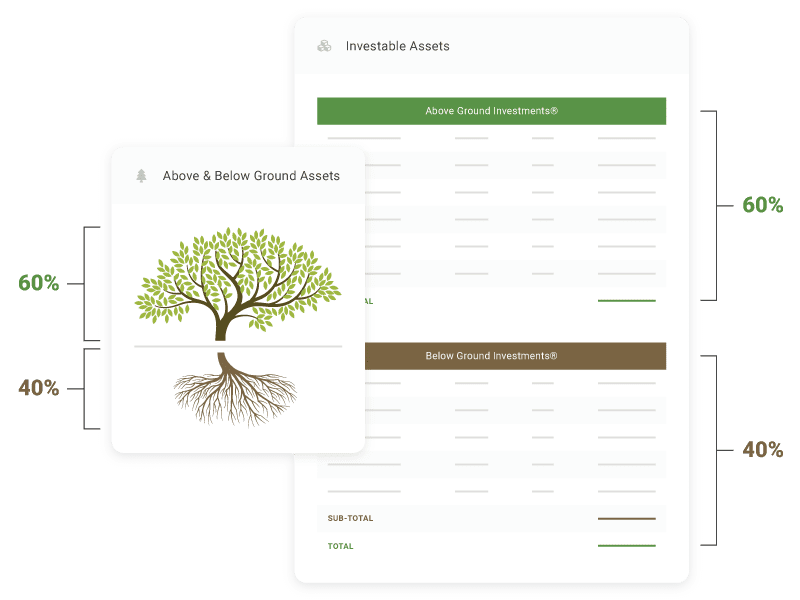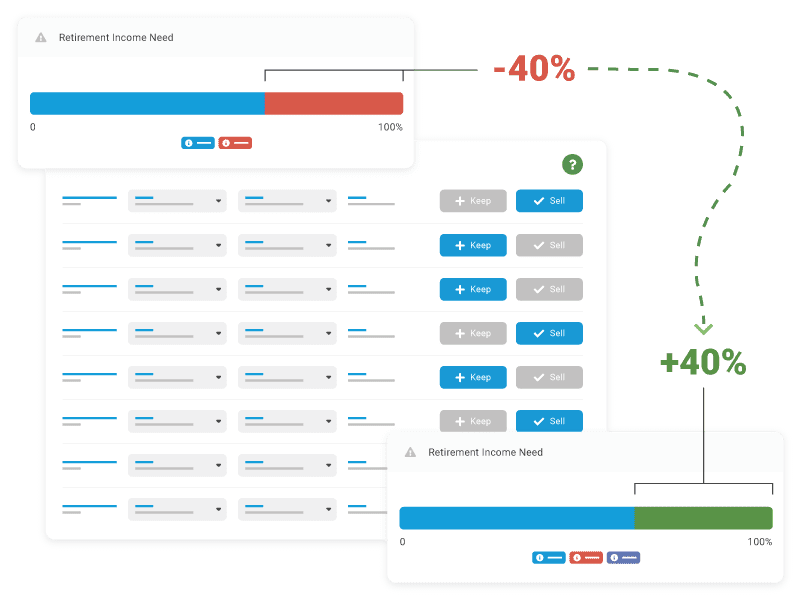A retirement evaluation is a very important step in the retirement planning process. It helps you understand your current financial situation and assists you in developing a plan to have enough retirement income to achieve your goals. Or, if you already have a plan, it can help you to determine whether you are on track to meet your goals.
The truth is, your social security benefits likely won’t be enough to financially sustain your retirement. At the end of the day, the goal of a retirement evaluation is to help ensure your retirement income is sufficient to maintain your current lifestyle without straining your finances. Whether you’re a young person just entering the workforce or a seasoned professional nearing retirement, the most important thing to remember is that it is never too late to make changes to your retirement plan. However, the earlier you start, the more time you will have to make adjustments.

Retirement Evaluation Overview – Kaizen Wealth
Retirement Evaluation Overview
An effective evaluation attempts to identify any blind spots in your plan, or areas that can be improved upon. This process may include a review of your current retirement savings total, annual income, expenses, debts, assets, and insurance coverage. It also takes into account your future needs, such as inflation and projected healthcare costs. Additionally, you should consider factors such as your age, investment portfolio, risk tolerance, and more.
A retirement evaluation can help:
- Provide a realistic and honest picture of your current financial situation.
- Create achievable retirement goals and assist you in developing a plan to reach them.
- Identify areas of opportunity in your portfolio.
- Arrive at a retirement income total number and assist you in making informed planning decisions.
- Reduce the associated stress and anxiety about when to retire and the outlook of retirement.
For a simple example, let’s say you’re 10 years away from retirement and you’ve just had a retirement evaluation. The data reveals you’re not on track to meet your goal of retiring with $1 million in savings. Based on this information, your financial advisor can develop a plan to help you increase your savings rate and make other changes to get you back on track.
A retirement evaluation can also be helpful if you’re already retired. Let’s say you leave the workforce and achieved your goal of $1 million in savings, but you discover during your first year of retirement your expenses are higher than you anticipated. A fresh evaluation can help you identify ways to cut costs and make adjustments to ensure your money lasts as long as you do.

Do you know your risk tolerance?
Why You Should Have a Retirement Evaluation Completed?
Now that you have an overview of the process, let’s take a deeper look at four key areas your financial advisor can assist you with. Keep in mind that, while these are key metrics to evaluate, they may not apply to everyone as each person has their own needs and areas of opportunity.
Risk Tolerance
First, a retirement evaluation can help you assess your risk tolerance and investment portfolio. As we all know, investment involves some risk, and therefore your investment strategy should be aligned with your given level of risk tolerance. For example, if you are risk-averse, you may want to carry significantly lower risk and invest more conservatively than someone willing to take more risks. What’s more, you may wish to invest in more aggressive vehicles if you’re a younger person, while you might be more inclined to reduce your risk with less volatile investments as you near retirement age.Supplemental Retirement Income
The evaluation process can help you develop a plan to generate retirement income during your golden years. This is important because you might need to replace the monthly wages from your job when you retire. A comprehensive assessment can help you determine how much retirement income you might need and can identify alternative sources of retirement income, such as part-time work or annuities.
Retirement Date
You’ve worked nearly your entire career to build a nest egg, but you need to know when you’ll have the appropriate retirement security to leave the workforce. With the help of your financial advisor, you can identify any potential problems or hurdles that may affect your ability to retire when you planned. For example, if you have high levels of debt, a retirement appraisal can help you create a plan to pay off your debts before reaching your actual full retirement age and will give you a more realistic target date for leaving the workforce.
- Estate Plan
A retirement evaluation can help confirm your estate plan is up to date. This is of paramount importance because your estate plan can change based on a variety of factors. Reviewing it regularly can allow you to ensure it meets your needs and the needs of your beneficiaries. When you have an evaluation, you can verify your estate plan includes all of the necessary documents, such as wills and trusts, and the beneficiary designations on all of your accounts are current. This can be important in the chance there may have been any changes in your family or a shift in how you would like your wishes carried out when you pass.

Retirement Evaluations: when to do them and what to expect
When to do a retirement evaluation and what to expect
There is no one-size-fits-all answer to the question of when to have a retirement evaluation. However, there are a few general guidelines that can help you decide when the time is right for you. In general, you should consider having a retirement evaluation if:
- You are nearing retirement age and have not yet done any retirement planning.
- You have experienced a major life change, such as a divorce, job loss, or serious illness.
- You are not sure if you are on track to meet your retirement goals.
- You are worried about running out of money in retirement.
How Often Should I Have a Retirement Evaluation Done?
As you can imagine, with so much riding on a successful retirement plan, an evaluation is not a once-and-done exercise. Ideally, you should have a professional retirement evaluation at least once a year, similar to a checkup at the doctor. However, if there are any major changes in your life (such as monthly income, divorce, etc.), then you may need to have one more often. Work with a certified financial planner who can assist you with scheduling regular follow-ups to perform a “health check” on your existing assets versus your future goals.

What to expect from a retirement evaluation – Kaizen Wealth
What Should I Expect from a Retirement Evaluation?
During your appointment with a financial advisor, you can expect to discuss your current retirement savings and future goals. While some of these topics may seem personal it’s important to be honest and accurate with the information you provide. It can give your financial professional the best chance at making effective changes that benefit you and your retirement plan.
Your session will likely begin with a deep dive into your household income and as always, it is helpful to arrive with the appropriate documentation to remove any guesswork. This includes things like your pre-retirement household income, your debts, your investments, pension benefits, projected social security benefits, and your overall retirement savings balance. Your advisor may also ask questions about your health, family history, and retirement plans. From there, they can help you to set goals. If you plan to take trips, buy a house, etc. be sure to share that with your financial professional. This can help them to develop a clearer picture of your desired lifestyle, monthly living expenses, and how much annual retirement savings you’ll need to afford it.
This plan may include things like annual contributions to other retirement accounts such as a 401(k) or IRA, saving money in a 529 tax-deferred savings account, or downsizing your home to free up some extra cash. Your advisor can also help you determine your exact level of risk and take steps to manage risk when selecting investments so you don’t end up jeopardizing your retirement savings while seeking larger capital gains.
Get Your Retirement Plan on Track
Having a retirement evaluation can help you understand your current financial situation and whether you’re on track to achieve your retirement goals. If you’re approaching retirement or are already retired, it’s critical to have a clear fiscal plan in place and this assessment can provide peace of mind that you and your family will be taken care of.
It’s never too early to begin gathering insights into your situation and seek the appropriate recommendations for how you can improve your chances of achieving a successful retirement. If you are nearing retirement age or have experienced a major life change, it may be time to schedule a retirement evaluation with a financial advisor, and by having one done at least once a year, you can identify any potential problems and make adjustments as needed.
Don’t wait until it’s too late—consider scheduling a complimentary consultation with Kaizen Wealth Management if you would like to learn more or to get started on a retirement evaluation today!



